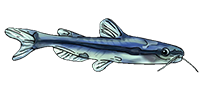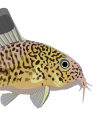| Scientific Name | Corydoras semiaquilus Weitzman, 1964 |
| Common Names | Peru Black Cory Panzerwels (Germany), Sort Pansermalle (Denmark) |
| Type Locality | Igarapé Preto, trib. upper Rio Salimões, Amazonas, Brazil. |
| Pronunciation | kor ee doh rass. |
| Etymology | Cory = helmet, doras = skin. In this case it was incorrectly used to mean armour (cuirasse) instead of skin in allusion to the dual rows of plates that run along the flanks of this genus. This specific epithet refers to the partial(semi=half) dark colouring(aquilus=dark-colouring)on the upper body scutes. |
| Size | 60mm or 2.4" SL. Find near, nearer or same sized spp. |
| Identification | Corydoras are identified by their twin rows of armour plates along the flanks and by having fewer than 10 dorsal fin rays. They are most commonly confused with the other genera in the sub-family, namely Brochis, Scleromystax and Aspidoras. |
| Sexing | Females grow larger and are more full-bodied, this is best observed from above the fish. Males will typically have more pointed as opposed to more rounded fin tips as they mature. |
| Distribution | South America: western Amazon River basin. Amazon, Upper Amazon (click on these areas to find other species found there) Login to view the map. |
| IUCN Red List Category | Least Concern , range map and more is available on the IUCN species page. Last assessed 2020. |
| Temperature | 22.0-26.0°C or 71.6-78.8°F (Show species within this range) |
| Feeding | Will readily accepted all prepared foods that reach the bottom of the aquarium such as tablets, granules and larger flakes. Live (or frozen) foods such as bloodworm, white worm, grindal worm (Enchytraeus), Daphnia and Tubifex are readily accepted and good for conditioning groups of fishes for spawning. User data. |
| Furniture | Ideally substrate should be sand, but rounded gravel is an imperfect alternative. Avoid keeping over rough edged (chipped) gravel, this will increase this risk of damage the fishes barbels when it tries to dig. Substrate should be bordered with driftwood and aquatic plants leaving an open area for them to search for food and swim. The shade provided by overhanging rock work, arching bogwood, tall or floating plants are all that is required to settle these fishes. |
| Compatibility | A peaceful, shoaling, community fish. |
| Breeding | Has been bred in the aquarium. |
| Breeding Reports | There are 2 breeding reports, read them all here. |
| Reference | Proceedings of the United States National Museum v. 116 (no. 3498), pp 121, Figs. 5-6. |
| Registered Keepers | There are 24 registered keepers, view all "my cats" data. |
| Wishlists | Love this species? Click the heart to add it to your wish list. There are 3 wishes to keep this species, see who wants what. |
| Spotters | Spotted this species somewhere? Click the binoculars! There are 11 records of this fish being seen, view them all. |
| Forum BBCode | |
| Search for C. semiaquilus | |
| Look up C. semiaquilus on AquaticRepublic.com | |
 | Look up C. semiaquilus on Fishbase |
 | Look up C. semiaquilus on Encyclopedia of Life |
 | Look up C. semiaquilus on Global Biodiversity Information Facility |
| LFS label creator ARN ref:1.1.686.494 | |
| Last Update | 2025 Jan 02 01:40 (species record created: 2001 May 05 00:00) |





/siluriformes/callichthyidae/corydoras/semiaquilus/1.jpg)
/siluriformes/callichthyidae/corydoras/semiaquilus/2.jpg)
/siluriformes/callichthyidae/corydoras/semiaquilus/3.jpg)
/siluriformes/callichthyidae/corydoras/semiaquilus/4.jpg)
/siluriformes/callichthyidae/corydoras/semiaquilus/5.jpg)
/siluriformes/callichthyidae/corydoras/semiaquilus/6.jpg)
/siluriformes/callichthyidae/corydoras/semiaquilus/7.jpg)
/siluriformes/callichthyidae/corydoras/semiaquilus/8.jpg)
/siluriformes/callichthyidae/corydoras/semiaquilus/9.jpg)
/siluriformes/callichthyidae/corydoras/semiaquilus/10.jpg)
/siluriformes/callichthyidae/corydoras/semiaquilus/11.jpg)
/siluriformes/callichthyidae/corydoras/semiaquilus/12.jpg)
/siluriformes/callichthyidae/corydoras/semiaquilus/13.jpg)
/siluriformes/callichthyidae/corydoras/semiaquilus/14.jpg)
/siluriformes/callichthyidae/corydoras/semiaquilus/15.jpg)